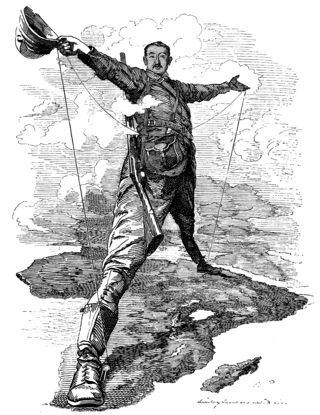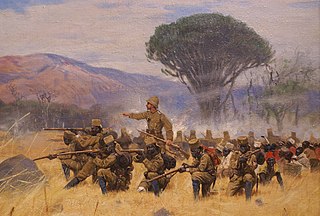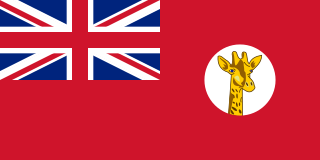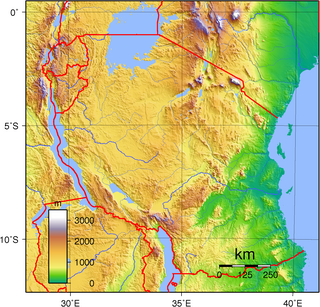Related Research Articles
The African Great Lakes nation of Tanzania dates formally from 1964, when it was formed out of the union of the much larger mainland territory of Tanganyika and the coastal archipelago of Zanzibar. The former was a colony and part of German East Africa from the 1880s to 1919’s when, under the League of Nations, it became a British mandate. It served as a British military outpost during World War II, providing financial help, munitions, and soldiers. In 1947, Tanganyika became a United Nations Trust Territory under British administration, a status it kept until its independence in 1961. The island of Zanzibar thrived as a trading hub, successively controlled by the Portuguese, the Sultanate of Oman, and then as a British protectorate by the end of the nineteenth century.

German East Africa was a German colony in the African Great Lakes region, which included present-day Burundi, Rwanda, the Tanzania mainland, and the Kionga Triangle, a small region later incorporated into Mozambique. GEA's area was 994,996 km2 (384,170 sq mi), which was nearly three times the area of present-day Germany and double the area of metropolitan Germany at the time.

The Scramble for Africa, also called the Partition of Africa, the Conquest of Africa or the Rape of Africa, was the invasion, annexation, division, and colonization of most of Africa by seven Western European powers during a short period known as New Imperialism. The 10 percent of Africa that was under formal European control in 1870 increased to almost 90 percent by 1914, with only Liberia and Ethiopia remaining independent.

The Bechuanaland Protectorate was a protectorate established on 31 March 1885, by the United Kingdom of Great Britain and Ireland in Southern Africa. It became the Republic of Botswana on 30 September 1966.

The German colonial empire constituted the overseas colonies, dependencies and territories of the German Empire. Unified in the early 1870s, the chancellor of this time period was Otto von Bismarck. Short-lived attempts at colonisation by individual German states had occurred in preceding centuries, but Bismarck resisted pressure to construct a colonial empire until the Scramble for Africa in 1884. Claiming much of the left-over uncolonised areas of Africa, Germany built the third-largest colonial empire at the time, after the British and French. The German Colonial Empire encompassed parts of several African countries, including parts of present-day Burundi, Rwanda, Tanzania, Namibia, Cameroon, Gabon, Congo, Central African Republic, Chad, Nigeria, Togo, Ghana, as well as northeastern New Guinea, Samoa and numerous Micronesian islands. Including mainland Germany, the empire had a total land area of 3,503,352 square kilometers and population of 80,125,993 people.

The Maji Maji Rebellion, was an armed rebellion of Islamic and animist Africans against German colonial rule in German East Africa. The war was triggered by German Colonial policies designed to force the indigenous population to grow cotton for export. The war lasted from 1905 to 1907, during which 75,000 to 300,000 died, overwhelmingly from famine.

Ruanda-Urundi, later Rwanda-Burundi, was a colonial territory, once part of German East Africa, which was occupied by troops from the Belgian Congo during the East African campaign in World War I and was administered by Belgium under military occupation from 1916 to 1922. It was subsequently awarded to Belgium as a Class-B Mandate under the League of Nations in 1922 and became a Trust Territory of the United Nations in the aftermath of World War II and the dissolution of the League. In 1962 Ruanda-Urundi became the two independent states of Rwanda and Burundi.

The German East Africa Company was a chartered colonial organization which brought about the establishment of German East Africa, a territory which eventually comprised the areas of modern Tanzania, Burundi, and Rwanda. The Company originated in 1884 as the Gesellschaft für deutsche Kolonisation with the aim of trading in Africa. The German protectorate of Wituland originated as a separate German sphere of influence in 1885. In April of the same year, the company leased the coastal strip opposite Zanzibar from Sultan Khalifa bin Said for 50 years. Its attempt to take over the administration led to a general revolt along the coast of what is now Tanzania. The company could only hold Dar es Salaam and Bagamoyo with the help of the German navy. In 1889 it had to request the assistance of the German government to put down the rebellion. In 1891, after it became apparent that the company could not handle its dominions, it sold out to the German government, which began to rule German East Africa directly. The company initially continued to operate its many activities, including mines, plantations, railways, banking, minting, etc., before it consented to relinquish them to the German colonial administration and other organizations. It subsequently operated as a land company within the German territory until Britain occupied German East Africa during World War I.

Wituland was a territory of approximately 3,000 square kilometres (1,200 sq mi) in East Africa centered on the town of Witu just inland from Indian Ocean port of Lamu north of the mouth of the Tana River in what is now Kenya.

SMS Seeadler was an unprotected cruiser of the Bussard class, the third member of a class of six ships built by the German Kaiserliche Marine. Her sister ships included Bussard, the lead ship, along with Falke, Condor, Cormoran, and Geier. Seeadler was built at the Kaiserliche Werft in Danzig in late 1890, launched in February 1892, and commissioned in August of that year. Intended for colonial service, Seeadler was armed with a main battery of eight 10.5-centimeter (4.1 in) guns and had a top speed of 15.5 knots.

Gustav Adolf Graf von Götzen was a German colonizer and Governor of German East Africa. He came to Rwanda in 1894 becoming the second European to enter the territory, since Oscar Baumann’s brief expedition in 1892, and later, he became the first European to cross the entire territory of Rwanda. Götzen was later governor of German East Africa (1901–1906).

The Sultanate of Zanzibar, also known as the Zanzibar Sultanate, was a state controlled by the Sultan of Zanzibar, in place between 1856 and 1964. The Sultanate's territories varied over time, and at their greatest extent spanned all of present-day Kenya and the Zanzibar Archipelago off the Swahili Coast. After a decline, the state had sovereignty over only the archipelago and a 16-kilometre-wide (10 mi) strip along the Kenyan coast, with the interior of Kenya constituting the British Kenya Colony and the coastal strip administered as a de facto part of that colony.
Kinjikitile "Bokero" Ngwale was a Tanzanian spiritual medium and a leader of the 1905–1907 Maji Maji Rebellion against colonial rule in German East Africa.

Tanganyika was a colonial territory in East Africa which was administered by the United Kingdom in various guises from 1916 to 1961. It was initially administered under a military occupation regime. From 20 July 1922, it was formalised into a League of Nations mandate under British rule. From 1946, it was administered by the UK as a United Nations trust territory.

Mainland Tanzania refers to the part of Tanzania on the continent of Africa; excluding the islands of Zanzibar. It corresponds with the area of the former country of Tanganyika.

Albrecht von Rechenberg, Albrecht Freiherr von Rechenberg or Georg Albrecht Julius Heinrich Friedrich Carl Ferdinand Maria Freiherr von Rechenberg was a German jurist, diplomat and a politician who served as Governor of German East Africa and as a member of the Imperial Diet.

Emil von Zelewski was a German officer of Kashubian descent who served as commander of the Schutztruppe for German East Africa. In the Hehe Revolt he was killed in action during the Battle of Rugaro.

Germany–Tanzania relations are the bilateral relations between Germany and Tanzania. From 1885 to 1918, Tanzania was a German colony as part of German East Africa. In the 21st century, relations are primarily characterized by the joint development cooperation.
References
- 1 2 3 4 Shamil Jeppie; Ebrahim Moosa; Richard L. Roberts, eds. (2010). "Muslim Family Law in Sub-Saharan Africa: Colonial Legacies and Post-colonial Challenges". Amsterdam University Press. pp. 275–276. ISBN 9789089641724.
- 1 2 Becker, Felicitas; Jigal, Beez (2005-01-01). Der Maji-Maji-Krieg in Deutsch-Ostafrika, 1905-1907. Ch. Links Verlag. ISBN 9783861533580. OCLC 60770766.